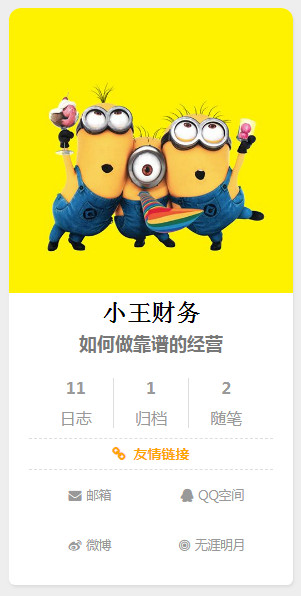1. 如何为博客更换自己喜欢的主题?
在项目配置文件_config.yml中的第73~76行:
# Extensions
## Plugins: https://hexo.io/plugins/
## Themes: https://hexo.io/themes/
theme: landscape默认的主题是landscape;主题的官方网址是:https://hexo.io/themes/
1. 选择并安装主题
访问网址,然后选择自己喜欢的主题样式。如:我选择的是:https://github.com/xiangming/landscape-plus
这个网页中也给出了安装的命令:
安装
从release页面下载,然后解压到hexo的themes目录下。
或者直接clone最新版:(可能会存在bug,不建议新手尝试)
# 在hexo根目录下执行
git clone https://github.com/xiangming/landscape-plus.git themes/landscape-plus2. 修改博客主配置文件
打开博客目录下的_config.yml配置文件,大约在73~76行可以看见配置主题。修改为刚才下载的主题的文件夹名:theme: landscape-plus
然后,还是在cmd窗口中,运行
hexo g
hexo s查看效果。
2. 主题配置
接下来就是对选定的主题进行配置。
a. 文章内容部分显示
首先打开地址127.0.0.1:4000,发现Hello World比较难受,它显示了整个篇幅。希望它显示部分,就在你需要截断的位置,加入<!--more-->
b. 左栏显示
左边的栏目没有显示内容,其实也就是自己没有设置。打开E:myblog\source\_postshello-world.md文件,然后加入下面的内容即可:
- - -
title: Hello World
category: "first"
tag:
- hexo
- - -c. 添加自我展示
左栏中没有我想要的自我展示框,感觉很难受,觉得有必要加入一个。
寻寻觅觅,发现左栏的内容布局文件就在这里:E:myblog\themes\landscape-plus\layout\_widget
好像可以自己定义一个,接着就尝试一下:
在该目录下,选择任意一个,赋值一个拷贝,改名称为:introduction.ejs
当然,相应的,我们需要在配置文件中申明一下,打开主题配置文件,大约在15~24行,找到Sidebar,在组件下面添加一个,如下:
widgets:
- introduction(此时,重新生成页面hexo g,重启服务hexo s可以看见效果)
容器是放到页面了,但是,页框的效果、文字内容不是我想要的,接着就再次修改。
打开文件,查看内容,发现其实就是HTML文档,不妨直接写HTML内容。
我们先找找样式文件位置,在:E:myblog\themes\landscape-plus\source\css
打开style.styl文件,然后在最后看见了导入样式的代码,很高兴。
于是,在_partial文件夹中,我创建了自己的样式文件,命名为sidebar-author,然后在style.styl文件中,添加的代码如下:
if sidebar
@import "_partial/sidebar"
@import "_partial/sidebar-author"接着,就开始编辑自定义的sidebar-author样式文件。观察其他的样式文件内容,不难发现代码中不使用括号、分号,使用两个空格的缩进来标志代码块。
也就是说,我们需要编辑两个文件:
- 一个是HTML(
E:myblog\themes\landscape-plus\layout\_widget\introduction.ejs); - 一个是CSS(
E:myblog\themes\landscape-plus\source\css\sidebar-author.styl)。
开始编辑:
圆角
感觉将侧栏中所有的widget,顶部都变成圆角比较好看,然后为了方便,在sidebar.styl文件中找到widget,添加代码:
.widget
...
border-top-left-radius:12px
border-top-right-radius:12px
border-bottom-left-radius:6px
border-bottom-right-radius:6px
...文章也应该使用圆角,在浏览器中审查元素,发现其div的class是article-inner,打开article.styl文件,第四行就是需要的article-inner,接着加入圆角样式。(这里略)
使用font-awesome
在css文件中没有我们希望的font-awesome.css文件,然后在浏览器中评论功能出发现使用了的,所以还是右键检查元素。然后可以看见,简单的使用如下:
.article-comment-link:before {
content: "\f075";
font-family: FontAwesome;
padding-right: 8px;
}故而我们就会用了。
百度一下找到font-awesome对应的代码:http://www.fontawesome.com.cn/faicons/
在应用的时候,如 fa-link Unicode:f0c1,我们content: "\f0c1";
常用的如下:
- qq:
fa-qq Unicode: f1d6 - 微信:
fa-weixin Unicode: f1d7 - 邮箱:
fa-envelope Unicode: f0e0 - 微博:
fa-weibo Unicode: f18a
效果展示

下面分别将这两个文件的内容放在下面:
HTML(E:myblog\themes\landscape-plus\layout\_widget\introduction.ejs):
<div class="widget-wrap">
<h3 class="widget-title">Introduction</h3>
<div class="widget introduction">
<img class="avatar" src="/images/timg.jpg">
<!--在E:myblog\source\ 目录下新建images目录, 然后存放的timg.jpg图片-->
<div class="site-info">
<h2>小王财务</h2>
<p>如何做靠谱的经营</p>
</div>
<div class="site-state-info">
<div>
<a href="/archives/">
<span>11</span>
<span>日志</span>
</a>
</div>
<div>
<a href="/archives/">
<span>1</span>
<span>归档</span>
</a>
</div>
<div>
<a href="/tags/">
<span>2</span>
<span>随笔</span>
</a>
</div>
</div>
<div class="site-firend-link">
<p>友情链接</p>
<p class="p-two">
<a href="1270563429@qq.com">邮箱</a>
<a href="https://user.qzone.qq.com/1270563429">QQ空间</a>
</p>
<p class="p-three">
<a href="http://blog.sina.com.cn/u/5385828767">微博</a>
<a href="https://baiyazi.top/">无涯明月</a>
</p>
</div>
</div>
</div>CSS(E:myblog\themes\landscape-plus\source\css\sidebar-author.styl ):
.introduction,.introduction img.avatar
padding:0
margin:0
padding-bottom:5px
.introduction img.avatar
border-top-left-radius:12px
border-top-right-radius:12px
.introduction img.avatar
width:100%;
.introduction div.site-info
text-align:center
margin-bottom:5px
.introduction div.site-info h2
font-size:24px
.introduction div.site-info p
font-size:18px
font-weight:bolder
.introduction div.site-state-info
display:flex
padding-left:30px
padding-right:30px
.introduction div.site-state-info div
flex:1
text-align:center
margin-top:20px
.introduction div.site-state-info div a
text-decoration:none
.introduction div.site-state-info div a:hover
color:#000
.introduction div.site-state-info div a span
display:block
font-size:16px
.introduction div.site-state-info div a span:first-child
font-weight:bolder
.introduction div.site-state-info div a span:last-child
margin-top:10px
.introduction div.site-state-info div:nth-child(1),
.introduction div.site-state-info div:nth-child(2)
border-right:1px solid #DDD
.introduction div.site-firend-link
padding:10px
.introduction div.site-firend-link p:last-child,
.introduction div.site-firend-link p:nth-child(2)
display:flex
.introduction div.site-firend-link p:first-child
border-top:1px dashed #DDD
border-bottom:1px dashed #DDD
color:orange
line-height:30px
text-align:center
font-weight:bolder
font-size:14px
.introduction div.site-firend-link p:first-child:before
content: "\f0c1";
font-family: FontAwesome
padding-right: 8px;
.introduction div.site-firend-link a
flex:1
text-align:center
height:50px
line-height:50px
text-decoration:none
.introduction div.site-firend-link p
margin-left:10px
margin-right:10px
.introduction div.site-firend-link p.p-two a:nth-child(2):before
content: "\f1d6";
font-family: FontAwesome
padding-right: 5px;
.introduction div.site-firend-link p.p-two a:nth-child(1):before
content: "\f0e0";
font-family: FontAwesome
padding-right: 5px;
.introduction div.site-firend-link p.p-three a:nth-child(1):before
content: "\f18a";
font-family: FontAwesome
padding-right: 5px;
.introduction div.site-firend-link p.p-three a:nth-child(2):before
content: "\f140";
font-family: FontAwesome
padding-right: 5px;篇幅是比较长,实际上没有多少东西。下面就继续对页面进行CSS定制。
但是吧,感觉希望自己还是自定义个主题,所以还是好好读读官网还是比较好。
所以还是研究研究。
由于前段时间写了关于Next主题的配置,这里也就不删除了,就直接跳过了。
这里给出学习官网的链接:这里




